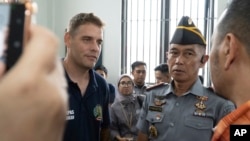The five remaining members of the Australian "Bali Nine" drug ring flew home Sunday after 19 years in jail in Indonesia, ending a saga that had frayed relations between the two countries.
Indonesian police arrested the nine Australians in 2005, convicting them of attempting to smuggle more than 8 kilograms of heroin off the holiday island of Bali.
In a case that drew global attention to Indonesia's unforgiving drug laws, two of the gang would eventually be executed by firing squad, while others served hefty prison sentences.
"The Australian Government can confirm that Australian citizens, Matthew Norman, Scott Rush, Martin Stephens, Si Yi Chen, and Michael Czugaj have returned to Australia," Canberra said in a statement.
"The men will have the opportunity to continue their personal rehabilitation and reintegration in Australia."
Australian Prime Minister Anthony Albanese said the men returned in the afternoon, and he had thanked Indonesian President Prabowo Subianto for his "compassion."
"Australia shares Indonesia's concern about the serious problem illicit drugs represents," Albanese said.
"The government will continue to cooperate with Indonesia to counter narcotics trafficking and transnational crime," he told reporters.
"These Australians spent more than 19 years in prison in Indonesia. It was time for them to come home."
The Australian government did not give further details on the agreement with Jakarta.
Firing squad
An Indonesian minister told AFP the five men had left the country as prisoners but "all the responsibilities for them" had now passed to Australia.
The men were accompanied on their flight home by three officials from the Australian Embassy, another Indonesian official said.
The Australian government said it had consistently advocated for the men and provided consular support to them and their families during their incarceration.
It asked the media to respect their privacy.
Australia's national broadcaster, ABC, said the men were now free, and would not have to serve further prison time at home.
The men had been given temporary accommodation and had made voluntary undertakings to continue their rehabilitation, it said.
It is not uncommon for foreigners to be arrested for drug offences in Bali, which attracts millions of visitors to its palm-fringed beaches every year.
Muslim-majority Indonesia has some of the world's toughest drug laws, including the death penalty for traffickers.
Accused "Bali Nine" ringleaders Andrew Chan and Myuran Sukumaran were executed by firing squad in 2015 despite repeated pleas from the Australian government, which recalled its ambassador at the time.
Tan Duc Thanh Nguyen died of cancer in 2018, months before Renae Lawrence was released after her sentence was commuted.
Heroin-lined suitcase
Australian police came under criticism after the Bali Nine's arrests for alerting Indonesian authorities to the drug-smuggling ring despite the death penalty risk.
The release of the Australians followed weeks of speculation that a deal for their return was in the works.
In November, a senior Indonesian minister said Jakarta aimed to return prisoners from Australia, France and the Philippines by the end of this year.
France last month requested the return of its citizen, Serge Atlaoui, a welder arrested in 2005 in a drugs factory outside Jakarta, according to a senior Indonesian minister.
Earlier this month, Indonesia signed an agreement with the Philippines for the return of mother of two Mary Jane Veloso, who was arrested in 2010 after the suitcase she was carrying was found to be lined with 2.6 kilograms of heroin.




